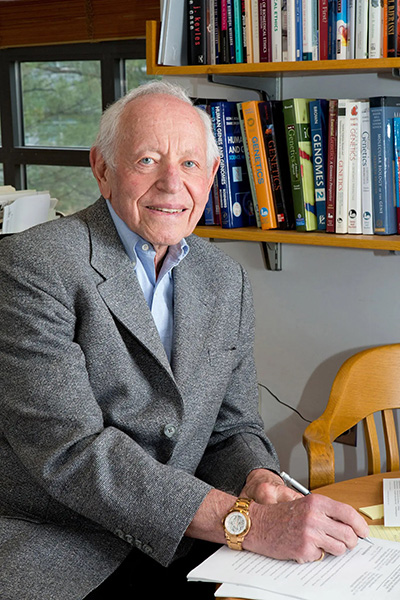In memoriam: Leon Rosenberg
Leon Emanuel Rosenberg, a pioneering physician–scientist who discovered the biochemical basis of several metabolic disorders and was a vocal advocate for women, underrepresented groups and people with mental illness, died July 22, 2022 at age 89. He was a member of the American Society for Biochemistry and Molecular Biology for more than 50 years.

Rosenberg was born March 3, 1933, in Madison, Wisconsin. His parents, Abraham and Celia Rosenberg, had fled persecution in present-day Belarus. He quickly learned English and opened his own general store. He was inspired to go into medicine after his mother suffered an accident and severe injury to her hand, according to his memoir, “Genes, Medicines, Moods: A Memoir of Success and Struggle.” He was about five years old at the time, he wrote.
After graduating as valedictorian of Madison West High School in 1950, Rosenberg earned his B.A. and M.D at the University of Wisconsin and then interned at New York–Presbyterian Hospital. As a research fellow at the National Institutes of Health, he became fascinated with genetics and metabolic diseases.
Rosenberg was a trailblazer in both basic and translational research as well as a catalyst for the field of personalized medicine. He revealed the biochemical and genetic basis of several severe metabolic disorders that cause diseases such as ketoacidosis. He developed and implemented lifesaving therapeutic treatments by modifying these patients’ diets or supplementing enzymatic deficiencies. His work also contributed to early prenatal diagnosis of genetic defects via biochemical analysis of metabolites in the amniotic fluid.
In 1965, Rosenberg took a faculty position Yale University where he later founded the first department of human genetics in the United States as well as the clinical genetics division. As the Yale School of Medicine's dean, he launched a magnetic resonance center and an office of minority affairs.
He was named the chief science officer at Bristol Myers Squibb in 1991 and then moved to Princeton University in 1998. After 16 years at Princeton, he taught upper school science at the Princeton Day School until he retired in 2018.
Rosenberg was elected to the American Academy of Arts and Sciences, the National Academy of Medicine and the National Academy of Sciences; awarded honorary degrees from the University of Wisconsin and the Mount Sinai School of Medicine; and received the Kober Medal from the Association of American Physicians and the McKusick Award from the American Society of Human Genetics.
In 1981, Rosenberg testified before a U.S. Senate subcommittee, passionately opposing a bill aimed at overturning the Roe v. Wade Supreme Court decision of 1973.
He also spoke out — and charged his peers to speak openly — about mental health and psychiatric illness. In an essay titled “Brainsick” in the magazine Cerebrum, he wrote, “It makes no sense to allow stigma, whose underlying premise is that people with mental illness are weak, to cow affected people into being unwilling to be diagnosed. It is time that I and other physicians say so.”
Rosenberg is survived by his wife Elaine, brother Irwin, four children, six grandchildren and one great-grandchild.
Enjoy reading ASBMB Today?
Become a member to receive the print edition four times a year and the digital edition monthly.
Learn moreGet the latest from ASBMB Today
Enter your email address, and we’ll send you a weekly email with recent articles, interviews and more.
Latest in People
People highlights or most popular articles

Simcox wins SACNAS mentorship award
She was recognized for her sustained excellence in mentorship and was honored at SACNAS’ 2025 National Conference.

From humble beginnings to unlocking lysosomal secrets
Monther Abu–Remaileh will receive the ASBMB’s 2026 Walter A. Shaw Young Investigator Award in Lipid Research at the ASBMB Annual Meeting, March 7-10 in Washington, D.C.

Chemistry meets biology to thwart parasites
Margaret Phillips will receive the Alice and C. C. Wang Award in Molecular Parasitology at the ASBMB Annual Meeting, March 7-10 in Washington, D.C.

ASBMB announces 2026 JBC/Tabor awardees
The seven awardees are first authors of outstanding papers published in 2025 in the Journal of Biological Chemistry.

Decoding how bacteria flip host’s molecular switches
Kim Orth will receive the Earl and Thressa Stadtman Distinguished Scientists Award at the ASBMB Annual Meeting, March 7–10, just outside of Washington, D.C.

Thiam elected to EMBO
He was recognized during the EMBO Members’ Meeting in Heidelberg, Germany, in October.
